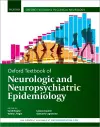
Oxford Textbook of Neurologic and Neuropsychiatric Epidemiology
4 contributors - Hardback
£135.00
Carol Brayne CBE is Professor of Public Health Medicine at the University of Cambridge and Director of the Cambridge Institute of Public Health. Graduating from the Royal Free Hospital School of Medicine at the University of London in 1981, she went on to train in general medicine from 1982-1983. Since then, her work has been focused around longitudinal studies of the neurological health of older people from a public health perspective. Since joining Cambridge, she has been appointed chair of the Faculty of Public Health, Academic & Research Comittee, CLAHRC theme lead, Special Adivsor to the Royal College of Physicians, fellow of the Academy of Sciences, and co-chair of the Alzherimer's Society Research Strategy Council. Listed among the highest cited scholars in the world in 2018, Professor Brayne was awarded a CBE for services to public health medicine in the Queen's 2017 Honours. Professor Valery Feigin is the director of Auckland University of Technology's National Institute for Stroke and Applied Neuroscience (NISAN), associate director of the Centre for Neurocomputation and Brain Study at KEDRI, and affiliate professor of the Department of Global Health at the Institute for Health Metrics and Evaluation at the University of Washington. A current board member of the World Stroke Organisation, Professor Feigin's work focuses predominantly on stroke, TBI, treatment, and epidemiology. He has authored or co-authored over 600 academic publications, and been cited over 31,000 times, and currently serves as Editor-in-Chief of the journal Neuroepidemiology. Feigin has received numerous awards over his career, including the Bruce Shoenburh International Award and Lecture in Neuropepidemiology, the Fogarty International Centre Research Grant Award, and the World Stroke Organization President's award for his services to stroke research. Dr. Launer is a senior investigator at the National Institute on Aging in Bethesda, Maryland. In 1987, she received her PhD in Epidemiology and Nutrition from Cornell University, after which she undertook a three year post-doctoral fellowship at NICHD. She has held positions at the National Insitute of Health and the Environment and Erasmus University, where she led and was involved with numerous large-scale epidemiological studies into dementia and migraine. Since 1999, she has led the Neuroepidemiology section of the NIA Laboratory of Epidemiology, Demography, and Biometry, where she has researched the genetic, inflammatory, vascular, metabolic, and hormonal factors of sub-clinical and clinical outcomes in brain disease. Giancarlo Logroscino, MD PhD is Professor of Neurology and director of the Neurodegenerative Diseases Unit at The University of Bari, and Chair of the Department of Clinical Research in Neurology at Pia Fondazione Panico in Tricase (LE). His primary research interests are natural history of neurodegenerative diseases and environmental risk factors for neurodegenerative diseases related to aging. He has been President of the Neuroepidemiological Italian Association (NEP), a member of the steering committee of the Italian Neurological Association (SIN), and Convenor for the Neuroepidemiology Section of the last meetings (Wien, Austria 2013) (Santiago, Chile 2015) of the World Federation of Neurology Congress. With more than 300 papers included in journals such as BMJ, JAMA, Lancet, Lancet Neurology, Annals of Neurology, Neurology and Brain, he is associate editor of the journal Neuroepidemiology, Karger, and Basel.